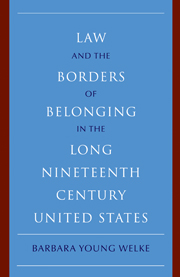Crossref Citations
This Book has been
cited by the following publications. This list is generated based on data provided by Crossref.
2010.
Freedom Bound.
p.
1.
2011.
Reading the American Novel 1780–1865.
p.
165.
Milewski, Melissa
2012.
From Slave to Litigant: African Americans in Court in the Postwar South, 1865–1920.
Law and History Review,
Vol. 30,
Issue. 3,
p.
723.
Batlan, Felice
2013.
A Companion to American Legal History.
p.
190.
Reilly, Kimberley A.
2013.
Wronged in Her Dearest Rights: Plaintiff Wives and the Transformation of Marital Consortium, 1870–1920.
Law and History Review,
Vol. 31,
Issue. 1,
p.
61.
Hyde, Carrie
2013.
The Climates of Liberty: Natural Rights in theCreoleCase and “The Heroic Slave”.
American Literature,
Vol. 85,
Issue. 3,
p.
475.
Altman, Clara
2013.
A Companion to American Legal History.
p.
543.
Anderson, Bridget
and
Shutes, Isabel
2014.
Migration and Care Labour.
p.
213.
Holdren, Nate
2014.
Incentivizing Safety and Discrimination: Employment Risks under Workmen’s Compensation in the Early Twentieth Century United States.
Enterprise and Society,
Vol. 15,
Issue. 1,
p.
31.
Tani, Karen M.
2015.
States' Rights, Welfare Rights, and the “Indian Problem”: Negotiating Citizenship and Sovereignty, 1935–1954.
Law and History Review,
Vol. 33,
Issue. 1,
p.
1.
Tomlins, Christopher
2016.
“Be Operational, or Disappear”: Thoughts on a Present Discontent.
Annual Review of Law and Social Science,
Vol. 12,
Issue. 1,
p.
1.
Vohra, P.
2016.
One of us? Negotiating multiple legal identities across the Viking diaspora.
Ethnic and Racial Studies,
Vol. 39,
Issue. 2,
p.
204.
Burton, Chase S.
2016.
Schools and Delinquency in the Early 20th Century: Rethinking the Origins of School Policing.
British Journal of Criminology,
p.
azw013.
Oliver, Caroline
and
Singal, Nidhi
2017.
Migration, disability and education: reflections from a special school in the east of England.
British Journal of Sociology of Education,
Vol. 38,
Issue. 8,
p.
1217.
2017.
A Companion to the Gilded Age and Progressive Era.
p.
454.
Yeo, Rebecca
2017.
The deprivation experienced by disabled asylum seekers in the United Kingdom: symptoms, causes, and possible solutions.
Disability & Society,
Vol. 32,
Issue. 5,
p.
657.
Sawyer, Logan E.
2017.
A Companion to the Gilded Age and Progressive Era.
p.
350.
Shott, Brian
2018.
FORTY ACRES AND A CARABAO: T. THOMAS FORTUNE, NEWSPAPERS, AND THE PACIFIC'S UNSTABLE COLOR LINES, 1902–03.
The Journal of the Gilded Age and Progressive Era,
Vol. 17,
Issue. 1,
p.
98.
Thompson, Lauren Macivor
2018.
“The Reasonable (Wo)man”: Physicians, Freedom of Contract, and Women's Rights, 1870–1930.
Law and History Review,
Vol. 36,
Issue. 4,
p.
771.
Jones, Martha S.
2018.
Birthright Citizens.



